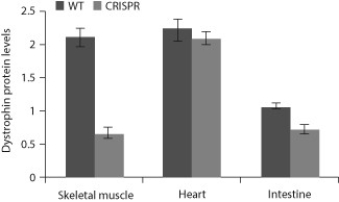Researchers are using the CRISPR-Cas9 system to genetically engineer organisms in order to study gene function and to attempt to help patients with genetic diseases. In 2016, a research team used the CRISPR-Cas9 system to genetically alter pig zygotes so that they would have muscular dystrophy, a type of genetic disease that results in muscle wasting and loss of muscle mass. This disease often results from a lack of the protein dystrophin in skeletal muscle tissue. Researchers sometimes develop animal models of diseases so that they can develop therapies to treat the human version of the disease.
The researchers compared the molecular biology and physiology of two types of pigs: healthy, normal pigs (WT) and those that were modified when they were zygotes with the CRISPR-Cas9 system (CRISPR) . The data below show the dystrophin levels in various tissues from both types of pigs.
 Source: Adapted from Yu, H. H., Zhao, H., Qing, Y. B., Pan, W. R., Jia, B. Y., Zhao, H. Y., Huang, X. X., et al. (2016) . Porcine zygote injection with Cas9/sgRNA results in DMD-modified pig with muscle dystrophy. International Journal of Molecular Sciences,17(10) : 1668. MDPI AG. Retrieved from http://dx.doi.org/10.3390/ijms17101668.
Source: Adapted from Yu, H. H., Zhao, H., Qing, Y. B., Pan, W. R., Jia, B. Y., Zhao, H. Y., Huang, X. X., et al. (2016) . Porcine zygote injection with Cas9/sgRNA results in DMD-modified pig with muscle dystrophy. International Journal of Molecular Sciences,17(10) : 1668. MDPI AG. Retrieved from http://dx.doi.org/10.3390/ijms17101668.
-What can you conclude from the figure?
A) The CRISPR-Cas9 system was mostly successful in specifically targeting the dystrophin gene only in skeletal muscle cells.
B) The dystrophin protein is not expressed in heart cells.
C) The WT pigs had a higher level of dystrophin mRNA in their intestinal cells when compared to the CRISPR pigs.
D) Cas9 acted to hydrolyze the dystrophin protein in all three tissues of the CRISPR pigs.
Correct Answer:
Verified
Q66: Use the accompanying figure to answer the
Q67: What sequence is indicated by the data
Q68: Use the accompanying figure to answer the
Q69: What type of cell is the Cas9
Q70: Four decades after the end of the
Q72: Which step in this process requires use
Q73: Four decades after the end of the
Q74: Which technology is possible to achieve using
Q75: Cystic fibrosis is an autosomal recessive genetic
Q76: Cystic fibrosis is an autosomal recessive genetic
Unlock this Answer For Free Now!
View this answer and more for free by performing one of the following actions

Scan the QR code to install the App and get 2 free unlocks

Unlock quizzes for free by uploading documents